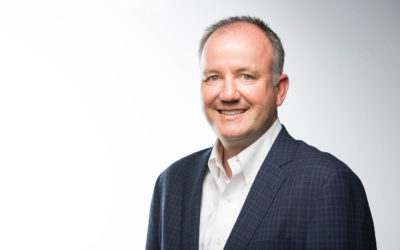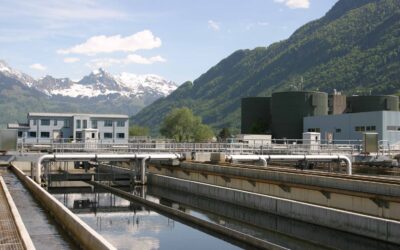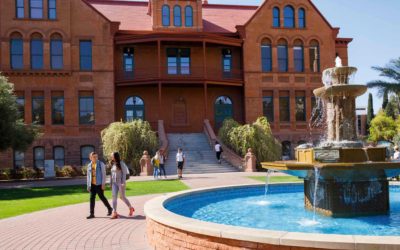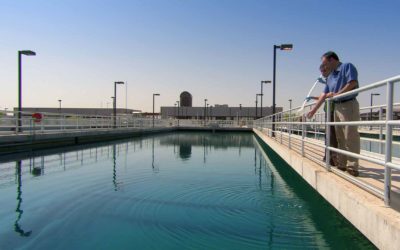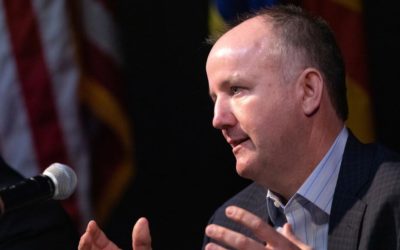Accolade-worthy achievements
Water treatment innovations and technologies to eradicate environmental toxins earn Fulton Schools professor place in National Academy of Engineering
By Joe Kullman
February 15, 2022
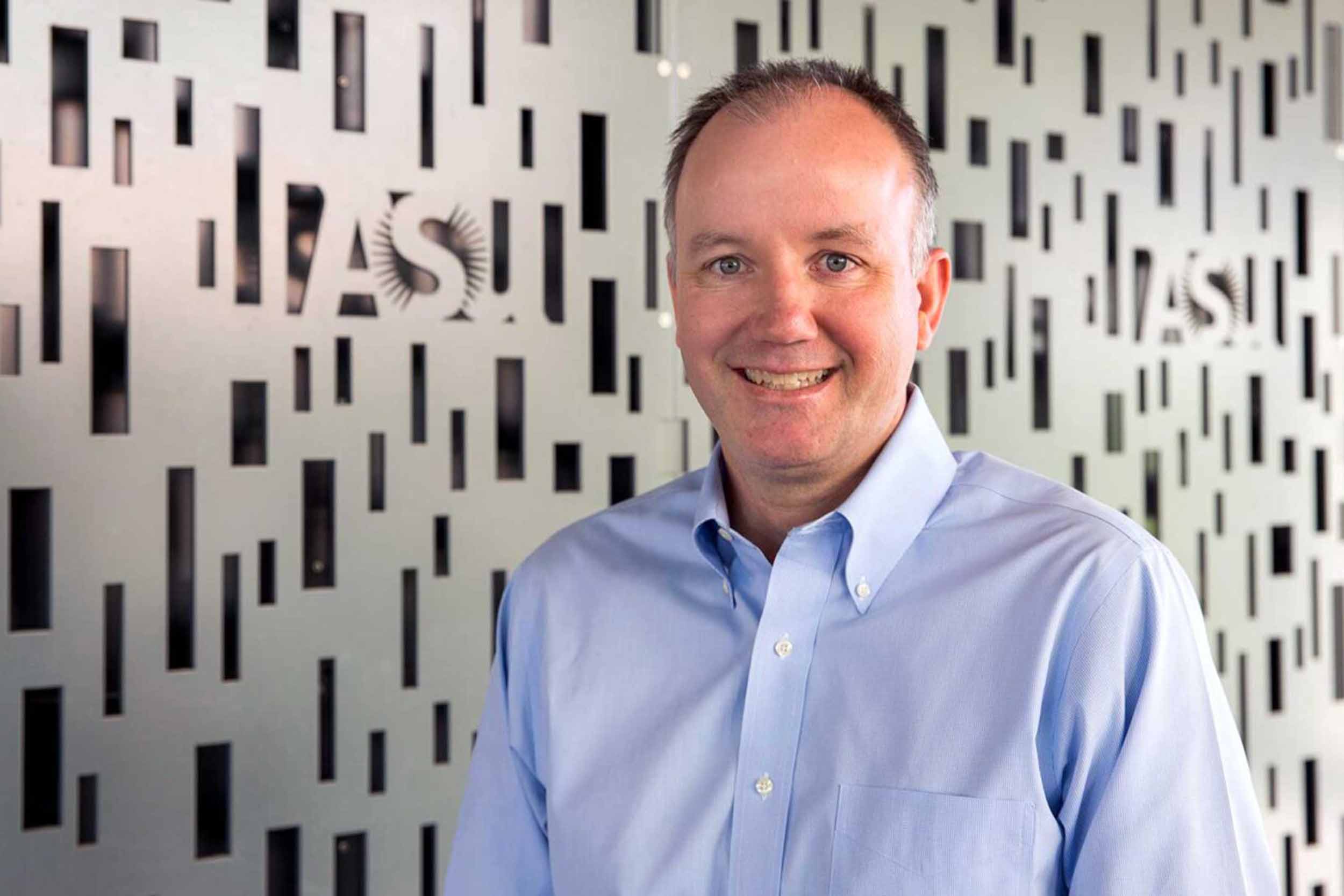
To a colleague who nominated Arizona State University Regents Professor Paul Westerhoff to be among the 2023 cohort of new National Academy of Engineering, or NAE, members, there was no doubt about the outcome.
“His election was a slam dunk,” says Pedro J.J. Alvarez, the George R. Brown Professor of Civil and Environmental Engineering at Rice University, of the honor bestowed on Westerhoff, a civil and environmental engineering faculty member in the School of Sustainable Engineering and the Built Environment, part of the Ira A. Fulton Schools of Engineering at ASU.
Election of new NAE members is a yearlong process. The organization annually considers numerous candidates who have been making notable contributions to engineering research, pioneering new practices and technologies in engineering fields, and developing and implementing innovative approaches to engineering education.
Given the extent and range of Westerhoff’s accomplishments, Alvarez asserts, the decision was inevitable. The NAE’s announcement of its new members states that Westerhoff was selected “for leadership and pioneering research on emerging contaminants assessment and water purification technologies.”
“This is a highly deserved recognition for Paul’s significant and long-lasting contributions to water safety through the development of advanced water treatment and reuse systems,” says Alvarez, who is the founding director of the National Science Foundation Nanosystems Engineering Research Center on Nanotechnology-Enabled Water Treatment, or NEWT. Westerhoff is the center’s deputy director.
Kyle Squires, ASU’s vice provost for engineering, computing and technology and dean of the Fulton Schools, foresees current and future solutions evolving from Westerhoff’s work producing significant and far-reaching societal impacts that merit the NAE’s recognition.
“The outcomes of Professor Westerhoff’s advanced water-related environmental engineering research ventures promise to provide tools, methods and systems to help ensure the sustainability of one of our most vital resources,” Squires says.
Professor Ram Pendyala, director of School of Sustainable Engineering and the Built Environment, says the school’s leadership “is absolutely delighted to see Paul Westerhoff recognized with this high honor for what are exceptionally outstanding and pioneering contributions to water treatment and development of novel technologies to rid the environment of toxins.”
“Professor Westerhoff epitomizes excellence on all fronts by combining consummate scholarship with an unparalleled dedication to mentorship and professional service,” Pendyala says. “We are fortunate to have him on our faculty and we’re looking forward to his continued leadership for many years to come.”
Award-winning engineering and education contributions
Many fellow ASU faculty members, university administrators, students and others who know Westerhoff would undoubtedly also note his skills as a teacher, mentor, innovator and academic leader.
During almost three decades at ASU, he has served as chair of the former Civil and Environmental Engineering Department and founding director of the School of Sustainable Engineering and the Built Environment.
Westerhoff has also been an associate dean of engineering research, an ASU vice provost for academic programming and a vice dean for research and innovation in engineering. He is the current Fulton Chair of Environmental Engineering.
Westerhoff has more than 350 publications in research journals. He has been awarded multiple patents for his work on the fate of nanomaterials in water, and has several best paper awards for journal publications. He is the current executive editor of the Environmental Science & Technology journal.
He is among the leading developers of new water treatment and reuse technologies, and a leading expert in chemical reactions related to the fate of pollutants during water treatment or in natural systems, with a focus natural organic matter and micropollutants.
His major research-related awards include the American Water Works Association A.P. Black Research Award, the National Water Research Institute Clarke Prize for outstanding achievement in water science and technology, and the Sustainable Nanotechnology Organization annual achievement award.
In addition, Westerhoff won the Water Research Foundation’s Paul L. Busch Award recognizing innovative research in water quality and water environments, and a Walter J. Weber, Jr. Frontier in Research Award from ARCADIS and the Association of Environmental Engineering and Science Professors. He has also won an ASU Outstanding Doctoral Mentor award.
Westerhoff is also affiliated with ASU’s School for the Future of Innovation in Society and is a Distinguished Global Futures Scientist in ASU’s Julie Ann Wrigley Global Futures Laboratory.
Now he is among the 17 ASU engineering faculty members who have been elected to the NAE, including current Fulton Schools professors Ronald Adrian, Dimitri Bertsekas, Gerald Heydt, Edward Kavazanjian, Subhash Mahajan, Bruce Rittmann and Vijay Vittal.
Progress in water environment sustainability
Along with nine awarded U.S. patents, many in conjunction with other faculty members and researchers, Westerhoff has dozens of patent applications and disclosures spanning multiple areas of civil, environmental and sustainable engineering.
Most of that progress has come from strides and he and various research partners at ASU and elsewhere have made through the efforts of the NEWT research center to find better ways to develop and protect sustainable water sources and environments.
“What we are good at is finding everything in water and determining if those things matter from a safety and health standpoint,” Westerhoff says. ”If they matter, we use what we’ve been learning from our research to enhance those environments.”
Eight new water treatment technologies and processes and six startup companies have sprung from NEWT’s endeavors. The center’s researchers have also partnered with some Fortune 500 companies to make their operations more environmentally sustainable.
The center’s projects are also giving students — primarily master’s degree and doctoral students — valuable opportunities to participate in work that can have positive impacts on their career trajectories.
“Many students I’ve worked with are getting employed in either industry, academia, or by research foundations or the government, by the Environmental Protection Agency, or EPA, and departments of environmental quality,” Westerhoff says. “Others are getting jobs helping companies build water and wastewater infrastructure that is reducing pollutants and waste.”
One such student is now a vice provost for research at a university, another is a vice president of a company, he notes, and many have found good jobs helping other countries develop modern infrastructure.
The progress being made by NEWT and similar research organizations has also led to more support for water science and engineering pursuits.
Researchers like those with NEWT have been getting steady support from the National Science Foundation, and in recent times Westerhoff says the EPA, NASA and the Department of Defense have become more active supporters of water-related research, along with some large companies like PepsiCo.
Entrepreneurial water treatment ventures
Demand for water treatment expertise is growing among businesses, industries, public utilities operations and other areas that can benefit from water research and related new technologies.
The trend has enabled Westerhoff and his wife, Kelly Westerhoff, an environmental engineer, to establish the company, H2Optic Insights. The small business commercializes new chemical-free optical fiber technologies for water treatment applications to provide solutions for unmet water treatment needs.
Using chemical-free, optical-fiber-based technologies, H2Optic Insights is adapting optical fibers to using ultraviolet, or UV, light-mediated processes to remove contaminants and solve drinking water treatment challenges.
The company is affiliated with the NEWT center and the Center for Entrepreneurial Innovation, NASA, and the federal government’s Small Business Innovation Research and Small Business Technology Transfer Program.
Westerhoff says his expanding pursuits at ASU and with the company should give him opportunities to fulfill the NAE’s stated expectations that its members use their expertise and skills to serve their communities and the public at large.
“The responsibility that comes with the NAE election is kind of humbling, but at the same time the wider credibility it gives you makes you confident in your abilities to help accomplish bigger things,” Westerhoff says. “I don’t know yet what the next step for me will be, but I’m going to try to make it a big one.”
Westerhoff and other newly elected NAE members will be inducted at the organization’s annual meeting on October 1.
Paul Westerhoff over the years
Taking STEPS
Paul Westerhoff and other ASU experts launch a national science and technology center to address challenges involving agriculture’s reliance on phosphorous
Paul Westerhoff receives 2021 Jankowski Legacy Award
Paul Westerhoff was recognized with the 2021 Daniel Jankowski Legacy Award for his decades of work at ASU as an administrator, researcher and professor.
Progress in water treatment earns accolades for engineering researchers
Naushita Sharma and Paul Westerhoff received accolades from the American Water Works Association for exemplary research in drinking water treatment.
11 ASU academics recognized as world’s most influential researchers over the past decade
Paul Westerhoff has earned wide recognition for his focus on the treatment and occurrence of emerging contaminants in various bodies of water, and the risks nanomaterials can create.
Paul Westerhoff selected for 2019 Clarke Prize
Paul Westerhoff was named the 2019 Clarke Prize Laureate for outstanding achievement in water science and technology by the National Water Research Institute.
Westerhoff appointed to new ASU vice provost post
Paul Westerhoff is taking on major responsibilities in positioning ASU to reach its research goals.

